NPR 毕节两则报道译稿之一
China Says It Has Ended Poverty. Is That True?
中国声称其已经结束了贫困。这是真的吗?
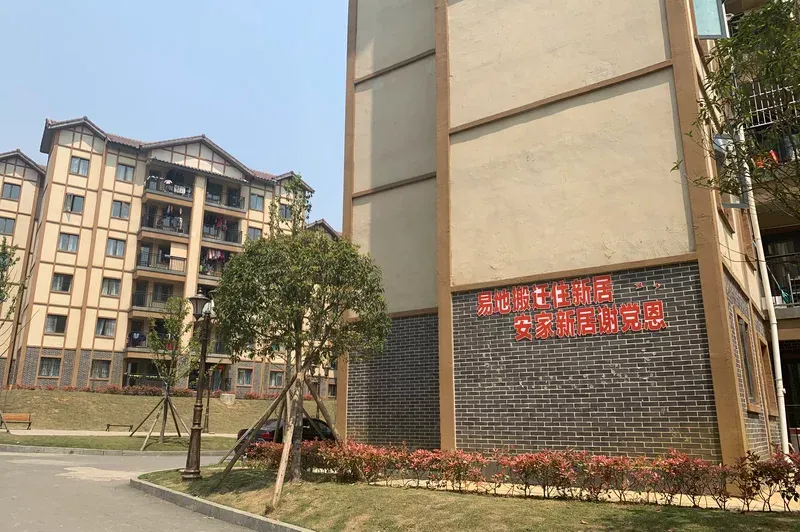
BIJIE, China – The Qixingguan community is designed to look like a socialist paradise. Identical rows of dozens of yellow apartment buildings, emblazoned with slogans expressing gratitude toward China's Communist Party, provide free living quarters for people once isolated in remote, mountainous villages. Near the complex, small garment factories were supposed to create jobs, and one of China's biggest real estate companies built two elementary schools.
毕节,中国——七星关社区的设计看起来像是社会主义天堂。几十排完全相同的黄色居民楼,被标语装饰着,标语的内容是感谢共产党为偏远山村居民提供免费住房。在小区旁边,几家小型服装厂创造了工作岗位。中国最大的房地产公司之一在此修建了两所小学。
But many of the complex's some 32,000 residents say they are still waiting for the life they were promised when the community launched in 2018.
但是,这个小区32000位居民中的一部分表示,他们暂时还没能享受到政府在2018年承诺过的生活。那时,社区才刚刚启用。
"We were tricked," said Luo Beiling, who relocated her family to Qixingguan, a new district in Bijie, a city scattered in between mountains in Guizhou province, in 2018. She and other residents say commitments to provide good jobs never materialized, revealing how the sticky legacy of inequality – between China's affluent urban centers and its more rural outposts – remains.
“我们被骗了。”罗贝岭(音)说。2018年,罗贝岭将她一家都搬到了毕节的一个新区——七星关。毕节市是贵州省的一个散布在群山之间的一座城市。她和其他居民表示(政府)对于提供好工作的承诺从未实现过。这透露出中国(少数)富裕城市中心和更多的农村偏远城镇之间的不平等的痼疾依旧存在。
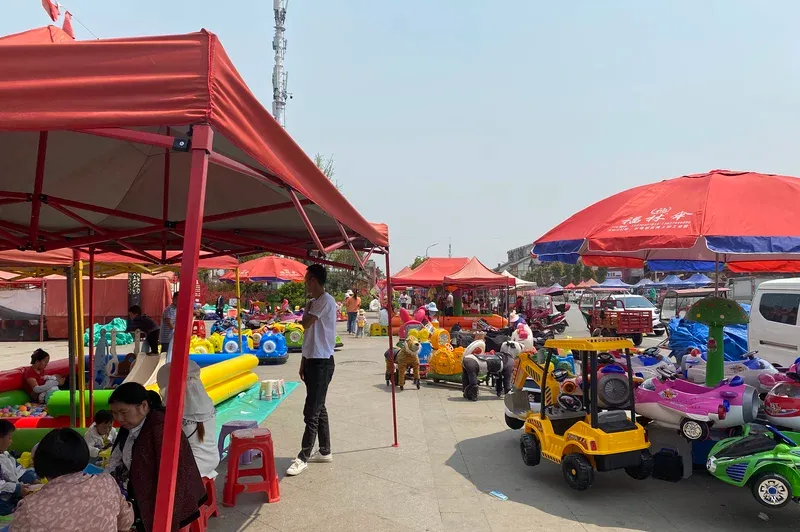
Many roads to prosperity
通往富裕的多条道路
Luo and her new neighbors are recipients of a massive social reengineering project designed to tackle long-standing rural poverty. Starting in 2015, local governments have built more than 700,000 miles of roads, threading together once far-flung communities to more prosperous economic hubs.
罗和她的邻居们是一场规模宏大的社会重建工程的受众,该工程旨在解决长期存在的农村贫困问题。自2015年起,当地政府已经修建了超过700000英里(约合1126540公里)的道路,将曾经偏远分散的社区与更加繁荣的经济中心连接起来。
To boost average incomes, China expanded its welfare system to give direct cash payments to rural retirees and those living below the poverty line. (China defines poverty as earning below RMB 4,000 a year, or around $600, a slightly lower threshold than the World Bank threshold for extreme poverty.)
为了提升平均收入,中国扩张了福利体系(的覆盖面),使其能直接补贴农村退休及生活在贫困线以下人员。中国的贫困定义为年收入4000元人民币,约合600美元。这条线划得比世界银行绝对贫困线稍微低一点、
Transforming mountainous Guizhou became a priority. Consistently the poorest province by per capita income, Guizhou has turned to everything from making rice liquor to building data farms in the last decade to raise wages. In 2019 alone, the province spent nearly RMB 1.8 trillion ($280 billion) on anti-poverty projects.
转型对于多山的贵州成了首要任务。以个人收入计,贵州一直是最穷的省。过去十年为了提升工资,从酿白酒到建数据中心,贵州省什么都干。仅2019年,贵州省在扶贫项目上的开支高达1.9万亿元人民币,约合2800亿美元。
Nearly a quarter of that funding went to Guizhou's Bijie prefecture, where Qixingguan sits. The prefecture became infamous for extreme poverty in 2015 when a woman there poisoned her four children with pesticide before killing herself, writing she could no longer bear her family's dire financial condition.
开支中的四分之一流向了贵州省毕节县,也就是七星关的所在地。2015年,该县以绝对贫困闻名于世。一位女性用农药毒死了自己的四个孩子,后自杀。她留下了的文字称自己难以承受自家糟糕的经济情况。
What about jobs?
那工作怎么样呢?
In November, China claimed victory. It announced that the entire country was now free of poverty. Soon after, Chinese leader Xi Jinping toured Bijie prefecture to inspect the results.
11月,中国宣告了胜利。中国宣布全国(所有的贫困县)均已脱贫摘帽。过了不久,国家领导人习近平前往毕节县视察(脱贫)成果。
But a central issue in Qixingguan and other rural regions remains the lack of high-paying jobs, which are still overwhelmingly concentrated in China's coastal cities. Authorities are prioritizing rural employment and say this year, they are aiming to employ 30 million of the 100 million people they say they've newly brought out of poverty.
但是对于七星关和其他农村地区来说,有一个中心问题依旧存在,那就是缺乏高薪工作。这些工作都完全集中在中国的沿海城市。政府将农村就业置于首位,并在今年表示1亿人的新脱贫人口中保证就业规模不低于3000万人。
"Shifting poor people into cities can also be a way of reducing rural poverty, but it can come at the cost of increased urban poverty," says John Donaldson, an assistant professor at Singapore Management University who has written a book on anti-poverty efforts in Guizhou.
“将贫困人口迁入城市也是一种缓解农村贫困的方法,但是这也会带来城市贫困加剧的代价。”约翰·唐纳森说道。唐纳森是新加坡管理大学的一位副教授,他撰写了一本关于贵州扶贫努力的书。
Having a steady income is particularly pressing for the nearly 10 million people, including those living in Qixingguan, who were relocated from rural villages into newly built townships and city districts during the anti-poverty campaign.
对于近千万(易地搬迁的)人来说,有稳定的收入是十分紧要的。包括七星关居民,他们在扶贫运动中从农村转移安置到了新建的小镇与城区。
In the process, they suddenly acquired property, at no cost. Property has been a major source of urban wealth in the last four decades, but most rural residents had been excluded from accumulating such wealth because of ironclad restrictions on selling rural land.
在这个过程中,(政府)用尽一切代价使他们拥有了房产。房产在过去四十年中已经成为城市财富的主要来源,但是大多数农村居民被排斥在外,因为(国家)对于销售农村土地难以打破的限制。
But in trading their village homes for urban ones, Qixingguan's residents lost ready access to land they once used for subsistence farming in negotiations where consent was hazy.
但是在用农村的家换城市的家之后,七星关的居民在谈判中失去了他们曾经自给自足的土地,而他们当初也是含糊地同意。
"Even if you stayed in the mountains, your house would be bulldozed to nothing along with the rest of the village," says Zhong Jianhua, a recent college graduate who relocated with his entire village to Qixingguan.
“就算是你呆在山区,你的房子也会和整个村子一样被拆得什么也不剩。”钟建华(音)说道。钟建华是一位刚刚毕业的大学生,他全村都被易地搬迁到了七星关。
Monthly welfare payments of RMB 300 ($45) for each adult were supposed to cushion the cost of moving, but residents say they never received any money.
每月给予每个成年人的300元人民币(合45美元)的福利(补贴)本应用来补助搬迁的费用,但是居民说他们从未收到过这笔钱。
Still, Zhong says he is happy with his family's new digs, where he lives with his parents and brother. His old village house was a fraction of the size of his new apartment. Driving out of the mountains to the nearest township took at least three hours. Public buses now ferry Qixingguan's residents for amenities such as shopping and entertainment — in less than half an hour.
钟建华表示对自己还是对自家新的住处感到满意,他与双亲和一个弟弟同住。他在农村的老房子面积只相当于新房子的一小部分。从山里到最近的县的车程至少要三个小时。现在公交车载着七星关的居民往返于小区和生活设施,像是购物和娱乐场所,只需要半个小时。
"The problem is that everything here costs money," says Zhong, laughing ruefully.
“问题是这里什么东西都要花钱。”钟建华说道,后悔地笑着。
That is precisely how authorities intended it, says Kristen Looney, an assistant professor at Georgetown University, where she studies rural development in China: "After the Asian financial crisis [in 1997], and especially after the global financial crisis a decade later, rural consumers came to be seen as the country's great untapped resource for economic growth.
这正是政府的意图,克丽斯滕·卢尼说道。克丽斯滕·卢尼是乔治城大学的一名副教授,她(主要)研究中国的农业发展:”1997年亚洲金融危机以后,特别是国际金融危机(爆发)十年之后,农村消费者已经被视为中国经济增长尚未开发的重要来源。“
"If these 100 million people can enter the middle-income group, their consumption will create huge potential [for economic growth]," Xia Gengsheng, vice director of a leadership group set up to oversee rural development, said at a government event on poverty alleviation in early April.
”如果这1亿人能成为中等收入群体,他们的消费将创造潜在的巨大经济增长点。“国家乡村振兴局副局长夏更生于今年四月上旬一次关于减贫的政府发布会上表示。
But for the plan to work, these people will need to find a new source of income other than social welfare payments or remittances from other family members. "Unless there are sufficient nonfarm jobs to support people in these newly urbanized villages, the math just won't add up for most people," Looney says.
但是为了计划能够运转,这些人需要找到一个除了社会福利补贴和家庭成员补助之外的的收入来源。”除非这些新近城市化的村子能为居民提供足够的非农工作,让其自给自足,(否则夏副局长说的话)数学上对于大多数人来说就不成立,“卢尼表示。
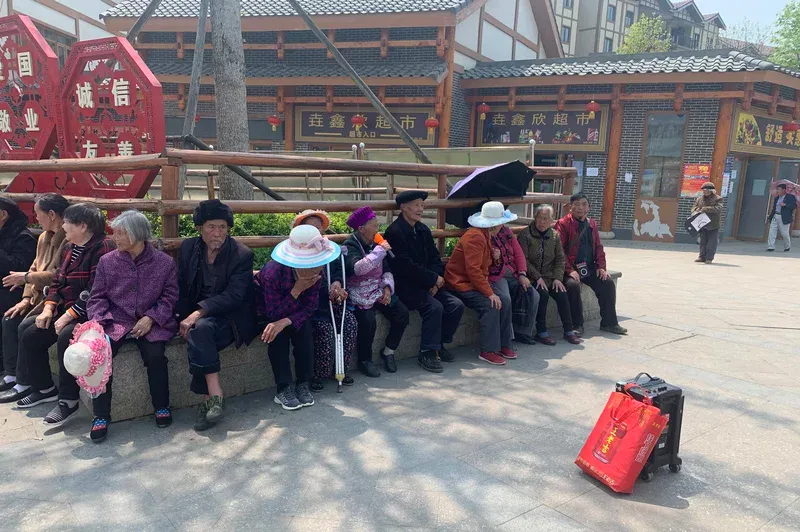
Factory solutions
工厂的解决方案
Seeking higher pay, Zhong left Bijie in April to pursue a factory job as many college graduates in China do, first in Fujian province, then Guangdong province. Both provinces, along China's eastern coast, have entrenched manufacturing hubs and offer higher pay than what Zhong could find in Guizhou.
为了更高的收入,像许多中国大学毕业生一样,钟建华离开了毕节去工厂工作。第一份工作是在福建省,第二份则在广东省。这两个地处东南沿海的省,都牢牢树立了制造业中心(地位),钟建华在这里的工资比他在贵州能找到的工作更高。
The government has tried to move factories in big coastal cities to rural communities. Dozens of small-scale garment and home goods factories have already popped up next to Qixingguan, set up by manufacturers, mostly from Guangdong, seeking lower labor costs. China says it has built thousands of these "satellite factories'' directly in rural communities to offset the historical employment gap between coastal cities and poorer, inland regions.
政府试图将一些位于沿海大城市的工厂迁到农村社区去。不少小型服装厂和家具厂已经出现在七星关附近,广东的制造商在此设厂追求更低的劳务成本。中国政府表示已经在农村社区就地修建了数千座”卫星工厂“,来弥补沿海城市与较为贫困的内地地区之间的差距。
"The pay is still too low," complained Zhang Zhengfu, a Qixingguan resident who sells fruit for a living. He says he gave up a well-paying job doing construction in coastal Zhejiang province and transferred his family back to Bijie to secure the free housing but has been dismayed at the average monthly salary at satellite factories – around RMB 2,000 a month (about $300) – which is about one-fifth of what he made before.
”工资还是太低了“。张政富(音),一位在七星关卖水果的居民抱怨道。他说他为了保证自家能得到免费住房,放弃了一个在沿海的浙江省做建筑工人的高薪工作并搬回了毕节。他对卫星工厂的工资很诧异——一个月约2000元人民币(约合300美元),这大概是他在浙江每月挣的五分之一。
"I am still young, but I do not think I can leave this place now. This is what the rest of my life looks like," he says ruefully.
”我还年轻,但我不认为我现在可以离开这里。这就是我剩下大半辈子的模样了“,他后悔地说。
Guizhou is also looking into social cooperatives to provide employment. Funded by state bodies and private conglomerates, the co-ops are mostly in agriculture and directly owned and managed by rural residents, but they have historically not been effective.
贵州也在研究让社会合作社来提供就业。受国家和私有大企业资助,合作社大多数集中在农业领域,由农民自有自管,但是历史上合作社的效率并不高。
"The track record is terrible, as most cooperatives are frauds. There are few authentic ones, and they really struggle," Singapore Management University's Donaldson says.
”过去的记录很糟糕,大多数合作社都是假的。也有几家真正的合作社,但是它们的处境很艰难“,新加坡管理大学副教授唐纳森表示。
Mushrooming income
种蘑菇的收入
One of the more successful so far is the Hequan mushroom co-op, built with state and private investment but majority-owned by the villagers themselves.
目前(在合作社中)一个较为成功(的案例)是和泉(音)蘑菇种植合作社,由国家和私人投资,但主要归村民所有。
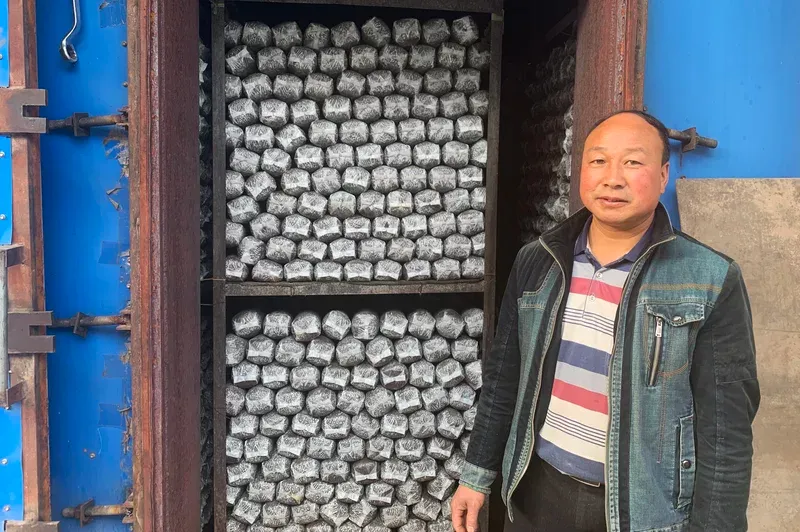
"We used to plant corn, which was easy to grow but brought in very little money. Now one mushroom greenhouse can bring in up to $4,500," dozens of times the revenue per square meter corn once did, says Sun Dahui, the co-op manager.
”我们之前种玉米,虽然很好种,但是赚的太少。现在一个蘑菇温室就可以带来超过4500美元的收入,每平方米收益较玉米翻了几十倍“,合作社经理孙大辉(音)说。
The co-op runs about 40 black-tarped greenhouses built by Evergrande, one of China's biggest real estate developers, which also built at least two elementary schools in Luo's complex in Qixingguan.
恒大承建了合作社大约40个黑色防水毡温室。作为中国最大的房地产开发商之一,恒大也在七星关罗贝岭所在的小区建了两所小学。
During NPR's visit, some greenhouses were still steaming with the flowery smell of rice liquor, which Sun uses to disinfect equipment before inoculating logs of wood mulch with shiitake mushroom spores. The co-op now employs about 600 people in nearby villages.
在 NPR 的访问中,一些温室散发着白酒的花香味。孙大辉在将香菇孢子种植到原木上之前,先用白酒消毒设备。合作社现在雇佣了600位附近村民。
Sun's biggest headache is that mushroom prices keep dropping. Two years ago, a kilogram sold for about RMB 16 ($2.50). Now prices have slid to around RMB 10 ($1.50), because all the nearby villages, inspired by Sun's example, are also growing mushrooms. The entire valley is blanketed with fungal greenhouses.
孙大辉最头痛的就是蘑菇价格持续下滑。两年前,一公斤蘑菇可以卖16元人民币(2.5美元)。如今价格已经下滑到了10元人民币(1.5美元)。这是孙大辉的例子启发了周边的村子,现在他们都在种蘑菇。整个山谷被真菌温室所覆盖。
Sun thinks he can out-compete them. "We are building our own processing facility to make mushroom-based sauces. We are going to be the next Laoganma," a multimillion-dollar sauce brand, he tells NPR.
孙大辉觉得自己能竞争得过他们。”我们正在建设自己的加工设施来制作基于蘑菇的各种酱料。我们会成为下一个老干妈(老干妈是一个价值数百万的酱料品牌)“,他对 NPR 说道。
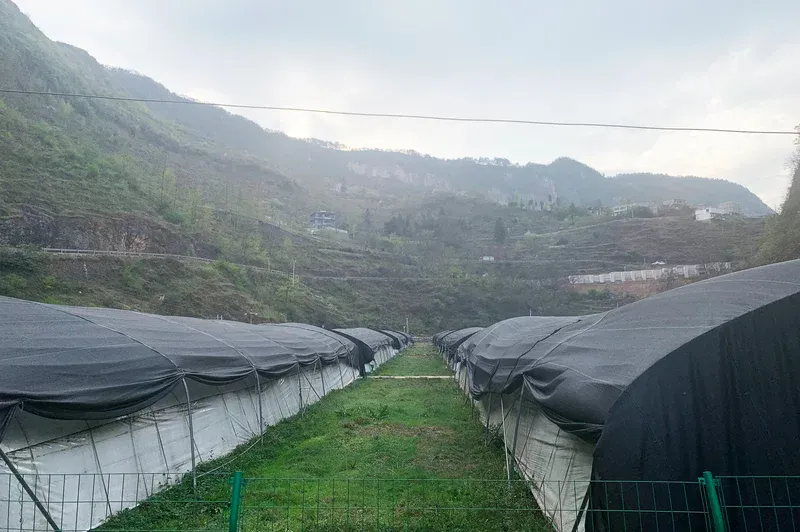
So it's not the government, but rather people such as the exuberant Sun who are now looking for ways to lift local incomes — and to keep people from sliding back into poverty.
所以说,不是政府,而是像孙大辉这样有激情的人在寻找提升当地人收入,并防止人们返贫的方法。
NPR's Amy Cheng contributed research from Bijie.
NPR 雇员 Amy Cheng 在毕节对本文也作出了贡献。
时间仓促,错漏在所难免,望指正。
正文中出现的英文姓名翻译参考了《英语姓名译名手册》(商务印书馆,2004)。部分括号中的内容系译者为行文流畅所添加的。非链接下划线系参考《人类减贫的中国实践》白皮书新闻发布会(下称发布会)中的职位说明。由于时间仓促,正文中引用发布会中与会官员的话没有参考发布会视频,系据英文直译,引用务必注意。
